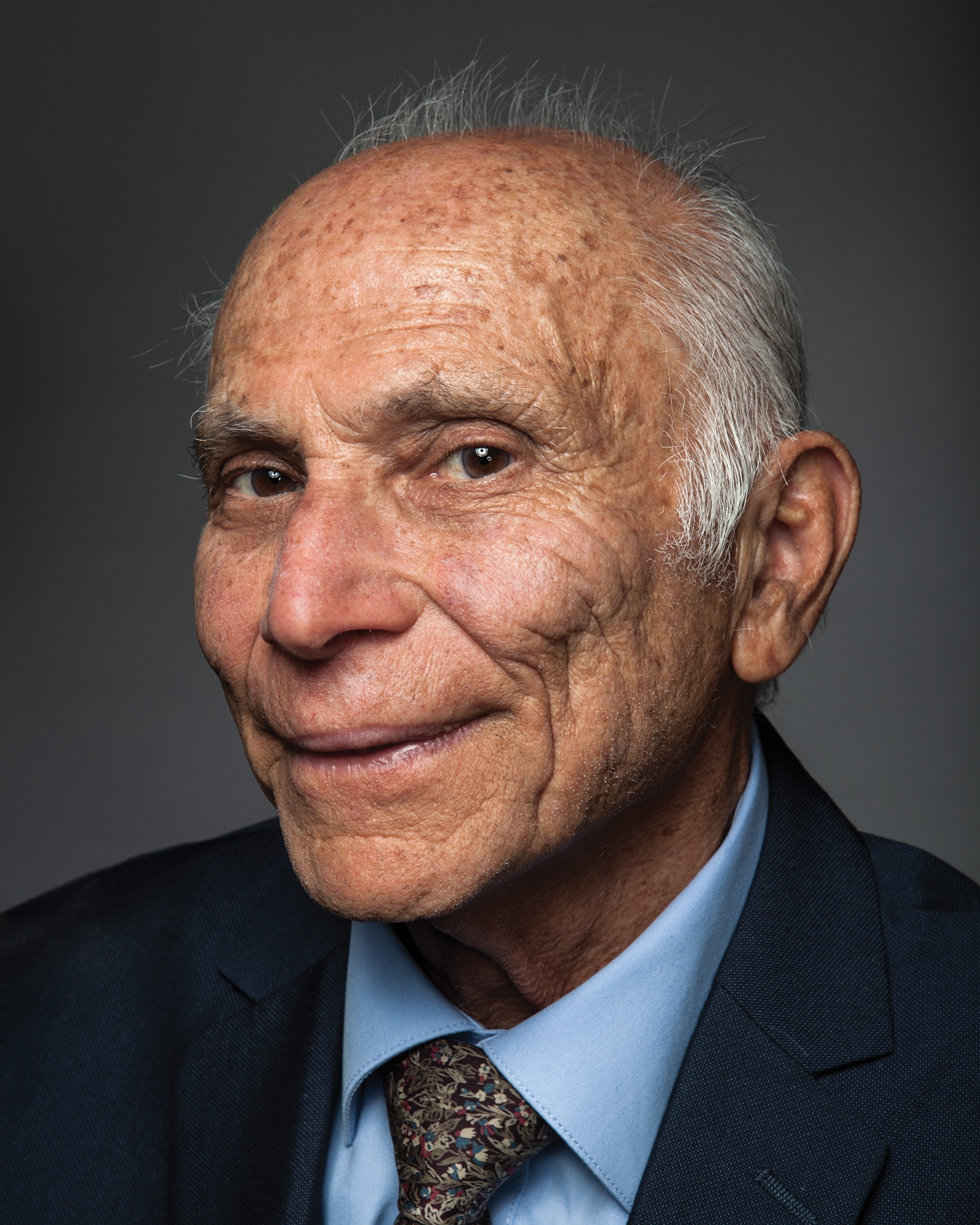A roar of applause surrounded Dr. Ahmed Ispahani as he rose from his seat. Every eye was on him.
Every shout out, every hand clap in the room was for him. As he made his way to the stage, he boasted his trademark smile that students and colleagues have adored for the last five decades.
It was his moment.
On May 1, 2015 the University of La Verne honored Ispahani for more than 50 years of dedicated service at the annual faculty and staff achievement ceremony.
A celebration that highlights career milestones and accomplishments, many in the audience expected to hear about Ispahani’s plans to retire as he accepted his award. Instead, the 81-year-old professor of business and economics took to the microphone to put to rest such rumors.
“I am not ready to retire,” he said with the same smile. “As long as I am healthy and relevant I will continue to teach. Teaching is not work for me; teaching is fun for me.” Laughter and praise filled the room as colleagues and friends admired the man who has brought stories, knowledge, wisdom and influence to campus every day since he first set foot on the steps of Founders Hall back in 1964.
Unsuspecting Professor
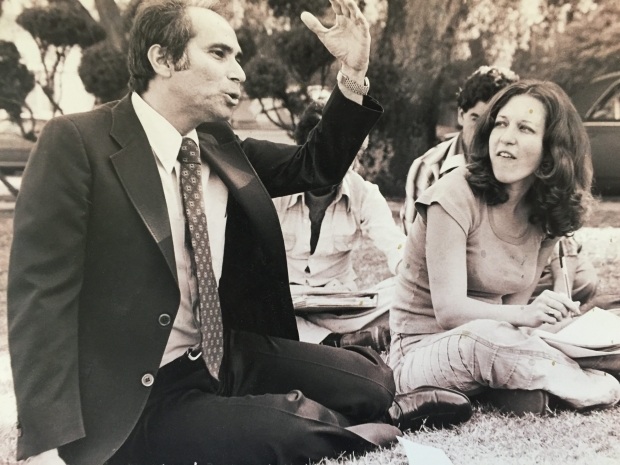
Ispahani got lost on his way to interview for the assistant professor of business and economics position at what was then La Verne College.
Driving through what seemed like never-ending orange groves, he pulled into a Texaco gas station to ask for directions. He encountered Frank Johnson, owner of the gas station and future Mayor of La Verne.
“I asked him, ‘Do you know where La Verne College is?’ He answered me back with a puzzled look on his face and said ‘It is right behind you,'” Ispahani recalled with a chuckle.
He did not realize that beyond the masses of orange trees stood Founders Hall, the center of the La Verne College campus and the location of his interview.
After discussing his qualifications for the position with President Harold D. Fasnacht, Ispahani felt confident his interview went well. Little did he realize that he would be hired that same day and offered an annual salary of $7,200. He accepted.
“And that was what started it all,” Ispahani said.
Originally from Iran, Ispahani came from a family of influential businesses owners. His father and grandfather owned a large soap manufacturing factory.
Ispahani’s family encouraged him at an early age to pursue his interest in business and numbers from a global perspective. And he did just that, earning a bachelor’s degree in economics from the University of Karachi in Pakistan as well as his master’s and doctoral degrees in economics from the University of Southern California.
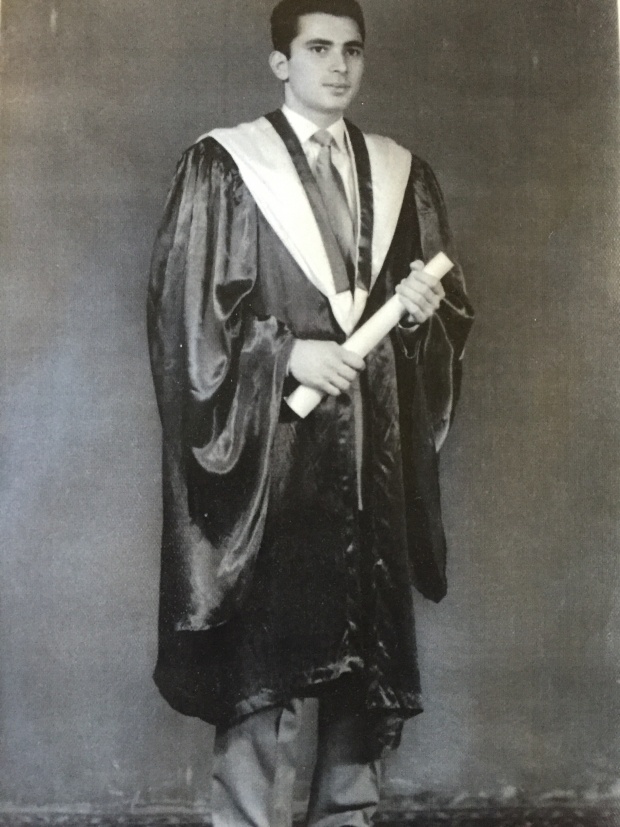
Ispahani had aspirations of working in global finance, which prompted him to be educated in America. Back in the 1960s, professional typing was a costly service and Ispahani needed to pay to have his entire dissertation typed before he could receive his doctorate.
It was one of the reasons he applied for the faculty position at La Verne.
“I did not think I would stay at La Verne for more than a year,” Ispahani said.
Not only did he pay for his typing while working at La Verne, but he gained a new insight into himself: he enjoyed teaching. After receiving encouragement for a job well done from his fellow faculty, Ispahani decided to extend his contract another year.
Soon, a few years became many and it became clear that the University of La Verne was where he belonged.
“What I look forward to the most is seeing my students’ enthusiastic faces eager to learn. That is what has kept me here all this time,” Ispahani said.
Avo Kechichian, the University’s chief financial officer, remembers what it was like to be a student of Dr. Ispahani.
“I remember those sunny days when he gathered the class and headed outside to an open space on the University lawn to lecture. He was more than a professor to me. He was somebody I could relate to.”
Global Impact
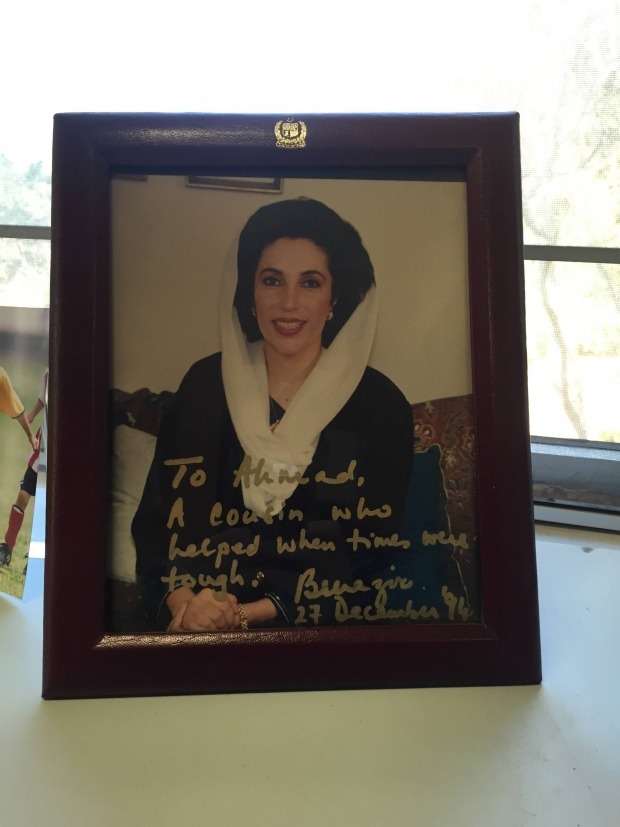
By the late 1960s, Ispahani had not only established himself as one of the University’s celebrated faculty, Iran began to take notice of the success of one of its own.
As the country moved toward the development of its own modern economic society, they sought out Ispahani’s expertise as a well-educated economist.
While he was happy teaching at the University, he felt compelled to pursue the experience of working for Iran’s government. It would also be his way of giving back to his country. The University encouraged this opportunity as well, but did not want to lose him.
Ispahani received a leave of absence.
During his time overseas, Ispahani worked as economic advisor for the Central Bank of Iran as well as the personal economic advisor to the Shah.
He also served as senior economist for Battelle Laboratories, which directly impacted several economic sectors of Iran. He traveled a great deal, meeting with both world leaders in the United Nations and citizens in developing provinces about their social economic needs.
“I was selected to lead the delegation to go to the U.N. in Geneva, Switzerland, where I served as a foreign delegate. That was one of the most rewarding experiences,” he said.
His overseas roles made Ispahani’s teaching that much richer. And he continued to bring a global perspective to his students even after he settled back at the University, particularly through his cousin, former Pakistan Prime Minister Benazir Bhutto.
She routinely came to visit Ispahani and spoke on campus to students about issues of equality and social justice. As her economic advisor and close confidant, the two were an inseparable pair and remained involved in each other’s lives until her untimely death in December 2007.
At the age of 54, she was assassinated after leaving a campaign rally during parliamentary elections in Pakistan.
“She cared for people. She sacrificed herself for the sake of her country,” Ispahani said. “She wanted to bring technology and education to the people of Pakistan. She wanted a more enlightened world, especially for developing countries.”
The loss of his cousin was devastating for Ispahani. But he vowed to keep her legacy alive through his dedication to education. Her legacy would continue at the University, through the Benazir Bhutto and Ahmed Ispahani International Lectureship, an honor bestowed to the dynamic duo by University of La Verne alumnus and trustee Paul Moseley ’88.
The lectureship, made possible by his generous gift in 2008, brings high profile international speakers to campus every year to speak on pertinent social issues affecting the world.
“I hope the lectureship series engages students and raises their level of awareness about what is happening in different parts of our world,” Moseley said. “I think everyone has a teacher or a professor that they connect with and Dr. Ispahani was that person for me.”
What Goes Around Comes Around
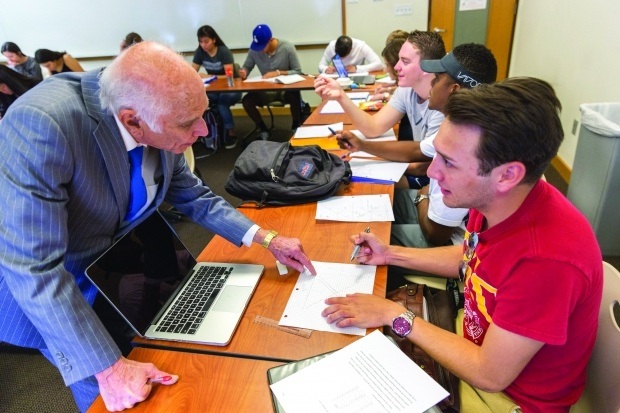
One of Ispahani’s philosophies is to practice the Golden Rule: do unto others as you would have them do unto you. It is how he was raised and how he chooses to live his life.
“If you can help someone, then help them in any way you can. That is how I live my life, and that is how I treat my students,” he said. Ispahani credits his parents with passing on their charitable values to him.
He also credits his mentor, John Elliott, his professor at USC, for showering him with kindness when he was new to America. “In the 1960s, there were few international students at USC. I didn’t have friends. The culture was different. I met John Elliott and we immediately clicked. He invited me to his home for a Christmas party and included me as one of his family,” Ispahani recalls.
The two remained friends throughout the years. Ispahani says he tries to emulate the character of his mentor in and outside the classroom. He believes kindness and intelligence go hand in hand. His level of commitment has left a lasting impression on generations.
Students seek out Ispahani’s classes, even if their majors do not require it. And they return some 10 or 20 years later to share the impact he has made in their lives. Richard Searing ’06 is just one example of a student who was touched by Ispahani. He only took one monthlong class with Ispahani during January Interterm in 2004.
“I loved his passion and enthusiasm,” Searing said. “His ability to let the class speak their mind and create an atmosphere where our opinions mattered – good and bad – helped prepare me for the real world.”
One of the happiest moments in Ispahani’s career came in the fall of 2015, when the Searing family – led by Board of Trustees Secretary Sue Searing ’71 and her husband Lee ’70, and joined by their children Christina, Richard and Katherine – surprised him by establishing the Searing Family Endowed Chair in Honor of Dr. Ahmed Isphahani.
“I was shocked. I was elated,” Ispahani said. “For the Searing family to do this in my honor so many years after I had Richard as a student, it is an incredible honor.”
An endowed chair is the greatest honor that can be bestowed upon a senior faculty member.
“Our family established the Endowed Chair as our way of honoring the quality of teaching, research and service that he has brought to the University of La Verne for over 50 years,” notes Mrs. Searing. “In particular, Dr. Ispahani has transformed the lives of thousands of students and has been a role model for faculty at the University and throughout the nation.”
The gift will support the establishment of a new position in the Department of Economics within the College of Business and Public Management. In the meantime, Dr. Ispahani serves as the inaugural chair holder. The family’s hope is the Endowed Chair will establish, in perpetuity, a faculty position that will carry forth the focus on students, on values, and the mission of the University of La Verne.
“That is why I say, when you help someone, sooner or later it comes around,” Ispahani said.
Instead of retirement, Ispahani is focused on the present and what makes him happy. It is an ideal he hopes others can follow.
“Do what you enjoy,” he said. “If you are happy with what you are doing and how you are filling your days, that, in my opinion, is a successful life.”
